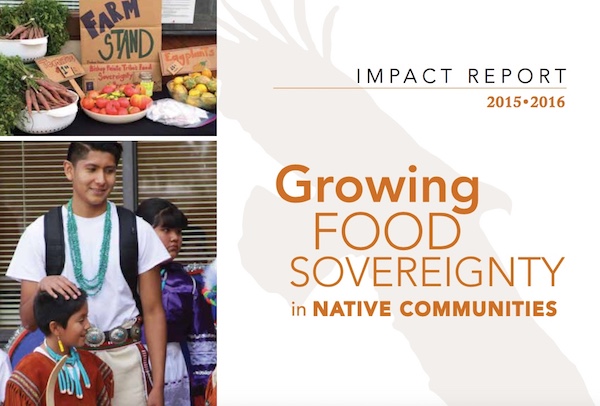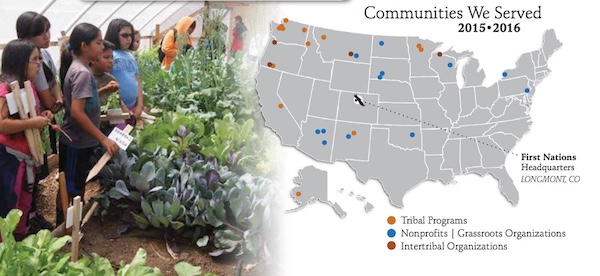 |
Canku Ota
|
 |
|
(Many Paths)
|
||
|
An Online Newsletter
Celebrating Native America
|
||
|
July 2017 - Volume 15
Number 7
|
||
|
|
||
|
Smokehouses, Farmers'
Markets and More:
'Growing Food Sovereignty' Report Reveals 'Seeds Of Native Health' Impact |
||
|
by Indian Country Media
Network Staff
|
||
|
First Nations'
report illustrates the power of its Shakopee Mdewakanton partnership
to reach 6,000 Natives with farmers' markets, smokehouses and more
For the Kalispel Tribe of Indians, the nearest grocery store to its community is 20 miles away. "Even that store lacks fresh and healthy foods. This project has really started community conversations about food, especially the availability of healthy foods for our people," said the Kalispel Tribe of Indians. The Shakopee Mdewakanton Sioux Community's (SMSC) Seeds of Native Health campaign supports grassroots practitioners in Native communities that are working toward improving Native nutrition, reversing chronic health problems, reducing extreme poverty and reclaiming traditional foodways in Native communities. The initiative, which focuses on the intersection between food, culture and youth, does more than simply feed and provide nourishment — it creates connections that were once strong but have been weakened or lost. The Shakopee Mdewakanton and First Nations' recently released report "Growing Food Sovereignty in Native Communities: Impact Report 2015-2016" illustrates the positive impact of the Seeds of Native Health Grants on more than 6,000 people in 53 Native American communities. First Nations Development Institute was the largest of the SMSC's Seeds of Native Health campaign's inaugural partners in its groundbreaking Seeds of Native Health campaign, which was launched in 2015. Because of First Nations' "longstanding expertise in efforts to eliminate food insecurity, build the health of communities, and support entrepreneurship and economic development," it received $1.4 million from the SMSC for re-granting to and management of projects relating to food access, food sovereignty, and capacity building. During 2015 and 2016, First Nations managed 30 separate grants under the program, supporting tribes and Native organizations in numerous states across the U.S. "Most of Indian Country is in a dietary health crisis. Supporting local efforts to build community gardens and provide access to fresh foods for vulnerable populations is critical to improving Native peoples' well-being," said SMSC Chairman Charles R. Vig. "First Nations' incredible expertise in this area has made them an ideal partner to help tribes and communities address this crisis." "Growing Food Sovereignty in Native Communities" finds that the grants from First Nations led to the community partners/grantees generating 63,613 pounds of harvested vegetables, 56,385 pounds of harvested wild rice, 1,572 pounds of harvested fruit, and 102 pounds of grown medicine, in addition to the more than 250,000 fish that were harvested. Fully 89 percent of these foods and medicines were donated to community members for subsistence purposes. The estimated food revenue that was saved and/or earned was $1.75 million, with the local communities leveraging an additional $1.56 million to support their community projects. These efforts served a total of 6,319 people, including 1,386 elders and 2,555 Native youth. Efforts included community gardens and smoke houses, farmers' markets, farm-to-school programs, classes, workshops and other activities. In addition, 129 new jobs and 859 food-related businesses were created or supported, nine new tribal food policies were developed, and two new traditional foods curricula were prepared. First Nations also provided technical assistance and training to grantees to assist with the long-term sustainability of programs, including topics such as strategic planning, business planning, financial recordkeeping, project management, and various specialized technical trainings. The report also highlights lessons learned from community partners that can further food sovereignty and nutrition for Native communities and other partners, including funders. The complete numbers can be found in the report, available for free download from the Knowledge Center on First Nations' website. "There is a vibrant and active food sovereignty movement taking place in Native communities, and the Seeds of Native Health campaign has been a tremendous asset in furthering the work of this dynamic, Native-led movement," noted Raymond Foxworth, First Nations' Vice President of Grantmaking, Development and Communications. "The Growing Food Sovereignty in Native Communities report documents Native innovation when it comes to community-led solutions to improving local food systems and Native nutrition. First Nations is honored to be a partner of the Shakopee Mdewakanton Sioux Community and the Seeds of Native Health campaign that will have a lasting impact in growing strong and healthy Native communities." Seeds of Native Health is rooted in the understanding that prior to colonization, Native peoples had self-sufficient and sustainable food systems. Yet removal from traditional homelands and thus limited access to traditional food sources, as well a transitions to cash economies, among other things, weakened tribal food systems. Today, many Native communities and households are food insecure and dependent on outside food sources and Western food stuffs that are often linked to negative and deteriorating health. Seeds of Native Health helps Native communities create self-sufficient food systems — foundational to reversing years of colonization aimed at the disintegration of cultural and traditional belief systems and dismantling of Native social and economic systems, the report states. Forty-three of the 53 communities served under the Seeds of Native Health Initiative are located in counties that the USDA defines as a food desert with an average poverty rate of 28 percent, compared to 13.5 percent nationally. Among the 2016 and 2015 partners awarded Seeds of Native Health funding were as follows.
2016 Community Partners Choctaw Fresh Produce • Philadelphia, Mississippi | $33,418
College of Menominee Nation • Keshena, Wisconsin | $34,332
Columbia River Inter-Tribal Fish Commission • Portland, Oregon | $30,000
Confederated Salish & Kootenai Tribes • Pablo, Montana | $34,343
Grasshopper Livestock Association • Cibecue, Arizona | $10,000
Great Lakes Indian Fish & Wildlife Commission • Odanah, Wisconsin | $31,336
Kalispel Tribe of Indians • Usk, Washington | $28,270
Klamath Tribal Health & Family Services • Klamath Falls, Oregon | $34,343
Muckleshoot Indian Tribe • Auburn, Washington | $17,418
Nooksack Indian Tribe • Deming, Washington | $30,478
Northern California Tribal Court Coalition • Talent, Oregon | $37,761
Nueta Hidatsa Sahnish College • New Town, North Dakota | $34,343
Oyate Networking Project/Oyate Teca Project • Kyle, South Dakota | $33,072
Red Lake Band of Chippewa Indians • Red Lake, Minnesota | $1,000
Squaxin Island Tribe • Shelton, Washington | $32,385
2015 Community Partners Bishop Paiute Tribe • Bishop, California | $40,000
Igiugig Village • Igiugig, Alaska | $39,794
Intertribal Agriculture Council • Billings, Montana | $17,887
Leech Lake Band of Ojibwe • Cass Lake, Minnesota | $33,743
Little Big Horn College • Crow Agency, Montana | $12,500
Mvskoke Food Sovereignty Initiative • Okmulgee, Oklahoma | $40,000
Nez Perce Tribe • Lapwai, Idaho | $37,629
North Leupp Family Farms • Leupp, Arizona | $34,650
Painted Desert Demonstration Project, DBA the STAR School • Flagstaff, Arizona | $40,000
Pueblo of Nambé • Santa Fe, New Mexico | $37,404
Red Lake Band of Chippewa Indians • Red Lake, Minnesota | $39,171
Seneca Diabetes Foundation • Irving, New York | $32,040
Suquamish Tribe • Suquamish, Washington | $28,773
Zuni Youth Enrichment Project • Zuni, New Mexico | $40,000
Thunder Valley Community Development Corporation • Porcupine, South Dakota | $21,909
|
||||
|
|
|
|
||
|
|
||
| Canku Ota is a free Newsletter celebrating Native America, its traditions and accomplishments . We do not provide subscriber or visitor names to anyone. Some articles presented in Canku Ota may contain copyright material. We have received appropriate permissions for republishing any articles. Material appearing here is distributed without profit or monetary gain to those who have expressed an interest. This is in accordance with Title 17 U.S.C. Section 107. | ||
|
Canku Ota is a copyright ©
2000 - 2017 of Vicki Williams Barry and Paul Barry.
|
||
 |
 |
|
|
The "Canku
Ota - A Newsletter Celebrating Native America" web site and
its design is the
|
||
|
Copyright ©
1999 - 2017 of Paul C. Barry.
|
||
|
All Rights Reserved.
|
||

